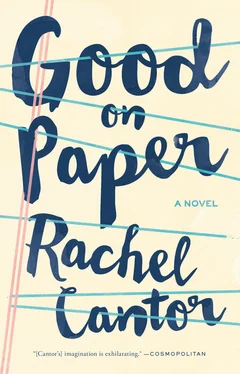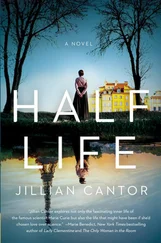How I wanted Benny’s opinion! I looked out of Joe’s window, hoping to see Benny on the street. Then I could “run into him,” let something slip.
Bad girl.
But I would need Benny, wouldn’t I? He could tell me about the Song ! He knew everything there was to know about the Bible. His rates would be reasonable: a single vegan donut oughta do it.
It had stopped raining. I gathered my books and papers, waved goodbye to Joe, and rushed to the Den, where I emailed Benny and faxed Romei: I need a Bible consultant, Benny’s a Hebrew scholar, could I possibly show him Romei’s work?
Did I specify that I only wanted to discuss a few lines? Why split hairs?

After dinner, Andi staged a Miss America pageant for her dolls. Ahmad played Bob Barker (in the left corner, weighing in at a sturdy seven ounces, is … Julie ? Julie is a corn husk doll from the Indian Plains. She likes to water-ski and … what ? Make brownies! Please welcome Julie !). As judge of this solemn entertainment, I tried not to laugh as Tink and her teddies strutted their stuff down a Wheaties-box catwalk.
When my phone rang, I didn’t want to answer.
Romei didn’t say hello: He just wanted to know, did I get the first pages? What did I think? He was calling from Rome, there was a strange delay in his responses.
Why would the Great Man care about my opinion?
Time for a station identification, I whispered.
What do you mean what do I think? I asked, buying time as I slipped into Andi’s room. I only got ten pages. What happened to the rest?
I send you the first part; the rest is not finish.
Not finished? How could he know the beginning if he hadn’t written the ending? He’d hired a translator before he’d even finished the work? I didn’t believe him. He was testing me, just as I thought, prepared to cut his losses!
So what are you thinking? he asked.
As it happened, I’d scribbled my “thinking” in my Door Number Two notebook just that afternoon.
As best I can tell, I said, your object is to write a mature, postexilic love story, an inversion of Dante’s youthful, pre- exilic fantasy. Undoubtedly, you hope to define an ultimate poetic, a poetic perhaps related to love, or perhaps to eros, more broadly defined. Indeed, the tension between Dante’s narcissistic form, concerned with the solitary writing subject and the inaccessible love object, and Esther’s interest in a mutual, embodied passion, where the beloved co-authors the text, as it were, is established early and suggests a competing poetics, a dialectic which I assume will be resolved by the end of the book.
I looked up. Ahmad had poked his head into the room.
Real people don’t talk like that, he whispered, then left the room.
Silence.
I took a breath and sat down on Andi’s bed.
And the story? he asked. What are you thinking?
What do you mean?
Are you interesting in this?
Was I interested in his story? As it happened, I wasn’t. I suspected the author’s purpose to be self-serving: the world should forgive him for breaking up a marriage. Assuming the world cared — and I didn’t think it did. I certainly didn’t.
I’m reserving judgment, I said. The characters don’t seem quite real.
He made a sound like a snort. I tried to explain: Why would a lovely stranger initiate erotic play-acting in a park? Was the narrator that irresistible? By his own admission he wasn’t. Would she turn out to be something other than a projection of the narrator’s erotic fantasies?
I knew I was talking about his wife, but I couldn’t help myself: “Esther” and the narrator were characters in a work of art. It wasn’t my job to “like” them, or pretend they were real!
This is the response of a spinster, Miss Greene. You think I give one fig for poetics? You are not the reader you think you are. I call again in one week.
And he was gone.
Fuck him! I thought, and pounded Andi’s guilt quilt with my fist. Where does he get off talking to me like that!
He called me a bad reader! Me?! A bad reader!
What had I missed? I hadn’t missed anything. Had I?
No! I thought. Real people don’t talk like that! Real people have it out, they say what they mean! If he thinks I’ve missed something, he should say so!
Spinster! He called me a spinster?
I’d had my share of affairs, but I didn’t bring them home, I didn’t allow them to become Andi’s concern. Andi came first for me, always, which was maybe why I disliked Esther: her happy ending was decided, but what would happen to the child as Esther played out her mutual, her embodied, her co-authored passion?
Spinster? I was a spinster. What of it?

I slept too few hours, got up to see Andi off to camp, then fell back asleep. I woke up again some time later, found Ahmad still in his bathrobe.
When I became a mother, I’d had no choice but to become a morning person; Ahmad never quite made the transition. His mornings with Andi, he was usually silent (hair on end, pajama bottoms inside out), no doubt to spare us his ill humor.
Late night? he asked.
Romei had called me a bad reader. I’d stayed up half the night trying to prove him wrong. I reread his pages and Vita Nuova , then read them again. My opinion hadn’t changed. No need to explain this to Ahmad, no need to tell him he might be right about Romei.
Besides, he looked barely awake. I lifted his wrist and looked at his watch.
Ten? Don’t you have a department meeting?
I called in sick.
Ahmad never called in sick, not even when he was sick. I waited.
Mirabella’s been in touch.
Mirabella? I asked, leaning over to put a hand on his shoulder. It had been ten years since his ex-wife, forced by her brothers, had taken their sons from the U.S. to Karachi.
He explained.
Though in purdah , Mirabella had gained access to the Internet through her cousin Shamseh, who’d finagled a laptop from her parents, saying she wanted to write ghazals for her fiancé, Jamal. Her younger brother had hooked her up to the Internet — her parents had no idea. Shamseh now had pen pals all around the world, she visited chat rooms disguised as Fork, the nongendered performance artist; Geraldine, the day trader; Lola, the Lesbian Leather Girl — all genres she’d become familiar with on the Net. A disciplined woman, she downloaded Shakespearian sonnets, spent one hour each day translating them into passable Urdu, then presented them to her parents, who planned to have them printed on vellum as a gift for Jamal.
No one seemed to recognize that they weren’t, strictly speaking, ghazals .
Young Shamseh, aware that Mirabella had experience of the world, confided her several secrets — the existence of the Internet portal, her increasing conviction that she was not exactly normal . Mirabella, intoxicated with the thought of escaping purdah , however briefly, told Shamseh she thought her desires entirely normal, aligned with Allah’s plan for the world, there were plenty of girls like her in the West, yes, it was true what they said about Ahmad, but he was a good man, God-fearing in his own way. Though of course she thought Shamseh an abomination.
Читать дальше













